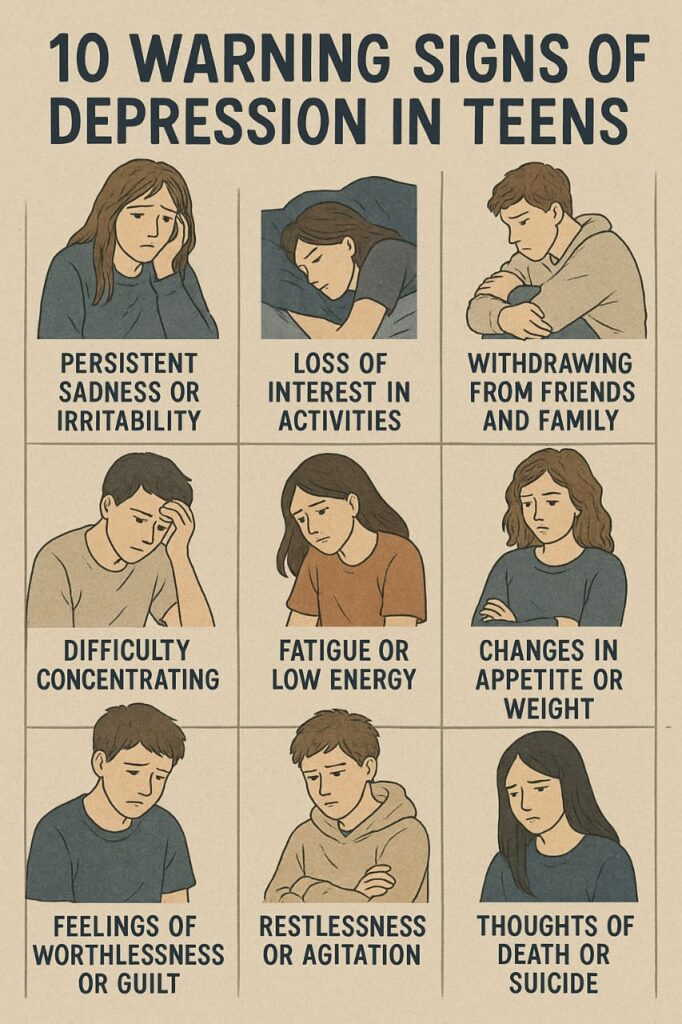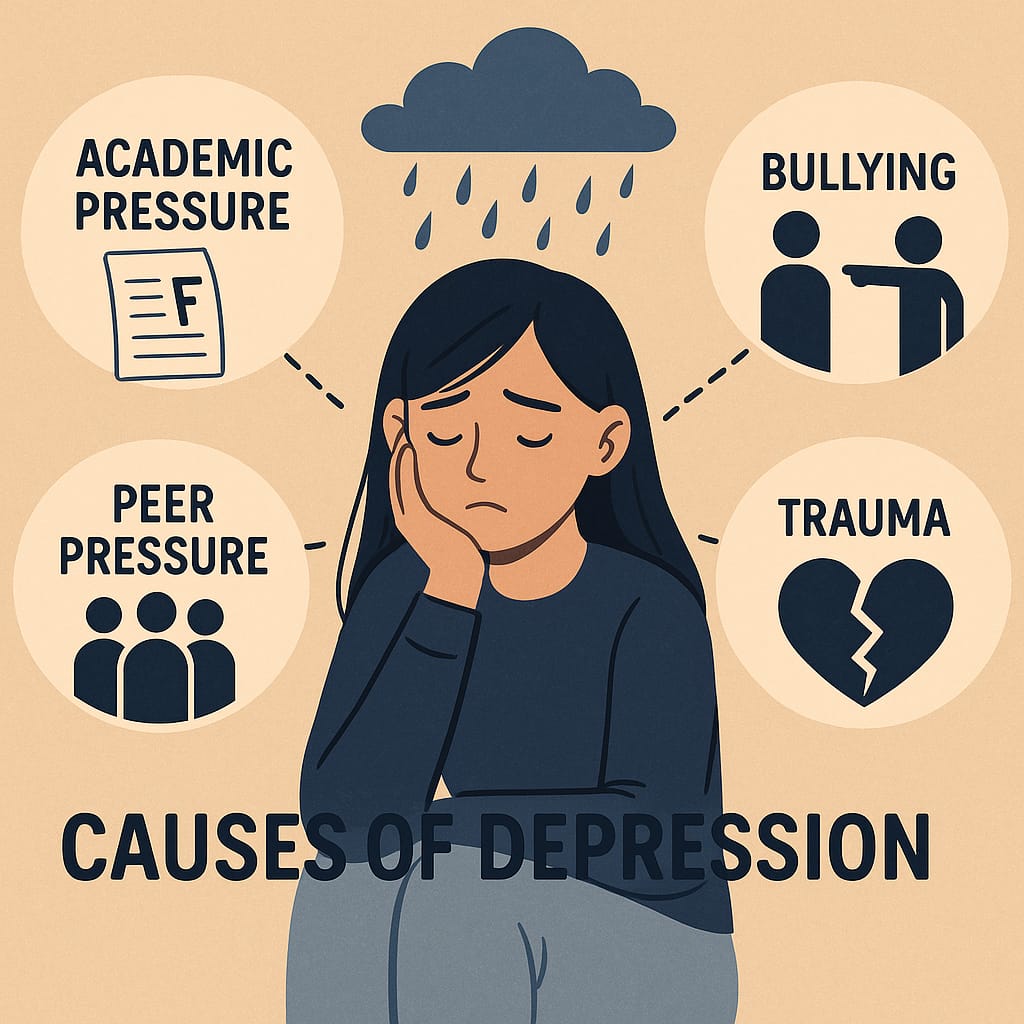Teenage years bring a whirlwind of changes—shaping the body, mind, and social life. It’s a time when young people begin to form their identity, navigate friendships, and face new challenges. While it’s natural for teens to feel moody or overwhelmed at times, persistent emotional struggles might signal something more serious: depression.
Teen depression is a real and growing issue that affects millions of adolescents worldwide. Identifying the symptoms early allows parents and caregivers to provide timely support and intervention. This blog explores the most common signs of depression in teens, why it happens, and how you can help.

What Is Teen Depression?
Adolescence is a time of significant transformation—marked by physical, emotional, and social changes. difficult to detect because symptoms often overlap with normal adolescent behavior. However, when negative emotions linger for weeks or months and interfere with daily life, it could be a sign of clinical depression.
It’s important to note that depression is not just about being sad. Teens with depression may feel empty, hopeless, irritable, or disconnected from the world around them.

10 Warning Signs of Depression in Teens
Let’s dive into the key signs that may indicate a teenager is experiencing depression. While not every teen will show all of these signs, the presence of several should raise concern.
1. Persistent Sadness or Crying Spells
A common symptom of depression in teens is ongoing sadness
that doesn’t go away. They may cry frequently or seem down all the time. This
sadness often has no clear reason and may last for weeks or longer.
2. Loss of Interest in Hobbies and Activities
If your teen no longer enjoys things they once loved—like
sports, music, art, or spending time with friends—this could be a red flag.
Depression often causes people to withdraw from activities that once brought them happiness.
3. Changes in Sleep Patterns
Teens with depression might have trouble sleeping or, in contrast, may sleep excessively. Insomnia and oversleeping are both warningsigns, especially when paired with fatigue and low energy.
4. Difficulty Concentrating or Making Decisions
You may notice that your teen has trouble focusing on
schoolwork, making decisions, or remembering things. These changes in thinking can result in lower academic performance and frustration.
5. Low Self-Esteem and Feelings of Worthlessness
Depressed teens often feel like they’re not good enough.
They may express guilt, self-blame, or a belief that they’re a burden. This
negative self-talk is more than just insecurity—it can indicate deep emotional
pain.
6. Social Withdrawal and Isolation
While it’s common for teens to seek independence,
withdrawing from family and friends entirely is concerning. If your teen avoids
social events, stops texting friends, or spends all their time alone,
depression could be a factor.
7. Changes in Appetite or Weight
Some teens may eat less and lose weight, while others may
overeat for comfort. Significant changes in appetite or weight, especially when unexplained, are common signs of emotional distress.
8. Physical Complaints with No Medical Cause
Depression can lead to unexplained aches and pains, such as
headaches, stomach issues, or muscle tension. If your teen frequently complains of feeling unwell but doctors find no clear reason, their mental health might be the root cause.
9. Risky or Self-Harming Behavior
Some teens engage in risky activities like substance abuse,
reckless driving, or self-harm (cutting, burning, etc.) as a way to cope. These behaviors can be dangerous and are urgent signs that professional help is needed.
10. Talk of Death or Suicide
Any mention of death, dying, or suicide must be taken seriously. Even casual jokes or subtle references like “I wish I wasn’t here” could indicate suicidal thoughts. Immediate action is needed in these cases—don’t wait.

What Causes Depression in Teens?
Teen depression doesn’t have a single cause. Instead, it often develops due to a mix of genetic factors, mental health challenges, and life circumstances
- Family issues such as divorce or conflict
- Academic pressure or fear of failure
- Bullying or cyberbullying
- Low self-worth or body image concerns
- Hormonal changes during puberty
- Grief or trauma
Social media can also play a role by creating pressure to appear perfect and increasing feelings of comparison.

How Can Parents Help a Depressed Teen?
Once you recognize the signs of depression, the next step is offering support without judgment. Here’s how:
- Start the Conversation
It can be uncomfortable, but asking your teen how they’re feeling shows you care. Use open-ended, non-threatening questions like:
“I’ve noticed you seem really down lately. Do you want to talk about it?” Avoid criticism or downplaying their feelings. Instead, listen and validate their emotions.
2. Encourage Professional Support
Depression is a health condition, and just like any illness,it often needs treatment. A licensed therapist or counselor can help your teen explore their feelings in a safe space. In more serious cases, medication maybe recommended by a doctor.
3. Create a Safe, Supportive Environment
Let your teen know they’re not alone. Be patient and
reassuring, even if they don’t open up right away. Keep routines consistent,
limit screen time, and encourage physical activity or creative outlets.
4. Stay Engaged
Check in regularly, offer quality time, and show interest in their life—even if they seem distant. Teens need to know someone is in their corner, even when they push people away.
When to Seek Immediate Help
If your teen shows signs of suicidal thoughts, has a plan to hurt themselves, or engages in self-harm, do not wait. Seek immediate help by contacting a mental health crisis line or going to the emergency room.
Final Thoughts
Identifying the symptoms of depression in teenagers is the first step toward recovery. As parents and caregivers, it’s our role to notice the changes, start the conversation, and guide our children toward the help they need.
